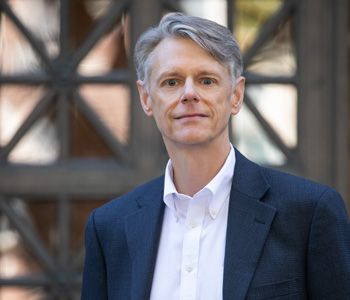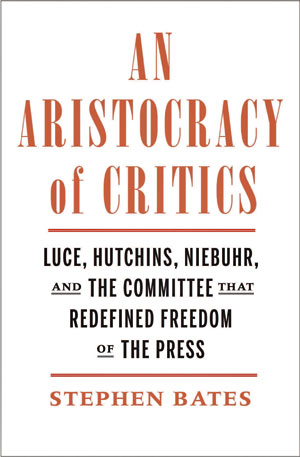
In 1943, Time Inc. editor-in-chief Henry R. Luce sponsored the greatest collaboration of public intellectuals in the twentieth century. He and University of Chicago president Robert Maynard Hutchins summoned the theologian Reinhold Niebuhr, the Pulitzer-winning poet Archibald MacLeish, and ten other preeminent American thinkers to form the Commission on Freedom of the Press. Luce wanted them to rethink freedom and responsibility of the news media. Assembling a committee to answer a philosophical question is an audacious notion, maybe a ludicrous one, but, miraculously, it worked.
After seventeen meetings, Commission members completed their final report, A Free and Responsible Press, which was published in 1947. It castigated the media for imperiling democracy with short-sighted, irresponsible behavior, including sensationalism, newsroom bias, and ads that masquerade as news. The press mostly rejected the criticism and denounced the critics. Even Henry Luce found the report disappointing. Yet in the years since, it has become a classic, the most important statement ever produced on the press and its role in a democracy. It has influenced the Supreme Court’s approach to free speech and shaped the education of generations of journalists.
Even so, it’s little known outside schools of journalism, and the full story behind it has never been told. My book shows how these thinkers debated vital questions, nearly failed in their mission, and in the end reached conclusions that are pertinent today—in some respects more pertinent now than in 1947. Broadly, the book captures a moment when public intellectuals held sway over matters of public interest. It also shows how a group of them, despite diverse philosophical views (plus big egos), listened to one another, established areas of agreement, explored areas of disagreement, and, often, changed their minds. In this way, Commission members modeled what they were trying to promote in American society: engaged, open-minded political discourse.
A Free and Responsible Press is a classic, but many of the Commission’s most incisive and prescient observations didn’t make it into the book. As the transcripts of their meetings show, they deliberated under conditions surprisingly similar to our own. They talked of polarization, rage, and the potential for violence if racists and nativists fell under the spell of a demagogue—much like the January 6 assault on the Capitol. The demagogue might be partly a media creation, like Charles Lindbergh in their day or, in ours, the star of The Apprentice. They said that partisan media make money from polarization, but in the process they become its prisoners: The audience won’t tolerate any deviation from the party line—as Fox News discovered when it began losing viewers to more strident outlets. They talked of disinformation spread by faceless organizations, including foreign governments, and of speakers de-platformed by ideological opponents. They worried about a scenario similar to what’s now being called post-truth politics: If arguments over facts get bafflingly complex, Americans might conclude that truth is unknowable, the news media untrustworthy, and democratic participation futile.
As a fellow at the Annenberg Washington Program in Communication Policy Studies in the 1990s, I wrote a monograph about the Commission, and I have returned to the topic periodically in the years since. I especially enjoy following the transcripts of the committee’s meetings, as some of the great minds of the twentieth century work through lofty philosophical problems, with the occasional detour into such mundane matters as comic strips and advise to the lovelorn.
Every few years, somebody proposes a reboot of the Hutchins Commission to address current media problems, but it can’t be repeated. If intellectuals of the same caliber still exist (some people doubt it), they don’t have the same status. Hutchins was twice on the cover of Time, and he thought seriously about running for president based on his stewardship of the University of Chicago. That’s virtually inconceivable for a university leader today.
Part of the backdrop to the Commission on Freedom of the Press is the acrimonious relationship between President Franklin D. Roosevelt’s administration and the press. I knew a bit about the anti-FDR venom in the right-wing press, especially the Chicago Tribune, which was published by the arch-conservative Colonel Robert R. McCormick, but I had no idea of President Roosevelt’s extensive efforts to get even with McCormick and other critics.
The Roosevelt administration repeatedly investigated the Tribune for criminal prosecution. Shortly before Pearl Harbor, the paper revealed that the government had drawn up secret contingency plans for invading Europe. This was big news, because FDR at the time was insisting that he had no intention of getting involved in the war. Roosevelt’s aide Harold Ickes wanted to prosecute the newspaper for treason, and the FBI conducted an investigation, though nothing came of it.
Then in 1942, after the Battle of Midway, a Tribune article suggested, correctly, that the military had broken the Japanese communications code. FDR talked of sending the Marines to occupy Tribune Tower in Chicago, as though it were enemy headquarters. Senator (later vice-president) Harry Truman wanted Colonel McCormick placed before a firing squad. The President repeatedly instructed the Justice Department to get a grand jury to indict the paper, but the grand jurors refused.
The Justice Department also considered prosecuting the Tribune for sedition based on its news coverage. According to a content analysis conducted at the Library of Congress, some themes in Tribune coverage overlapped with themes in Axis propaganda. Both, for instance, said that FDR was corrupt and that he was bungling the war effort. A Justice Department attorney wanted to seek an indictment. It didn’t matter whether editors were consciously trying to help the Axis, he said; all that mattered was the effect on readers. No prosecution took place, but FDR in a Fireside Chat denounced “bogus patriots who (…) echo the sentiments of the propagandists in Tokyo and Berlin.”
The administration did launch an antitrust action against the Associated Press and its board. FBI agents interrogated McCormick and other board members, which some of them considered strong-arm tactics. The attorney general argued against bringing the case, but the President insisted. Finally, the Justice Department filed a civil enforcement action against the AP, backed by threats to bring criminal prosecutions against board members personally if they didn’t back down. The federal antitrust chief told Colonel McCormick to expect to be indicted. The government won its civil case, and the AP complied. Board members weren’t prosecuted. The antitrust case was justifiable, as the Supreme Court ultimately ruled, but the President’s involvement was indefensible.
In their hatred of the press, Richard Nixon and Donald Trump may have been more outspoken than FDR, but even they didn’t go as far as he did in trying to use the machinery of the federal government to get even with critics.
Just as Hutchins Commission members worked under conditions similar to ours, they discussed ideas that people are discussing again today. They talked of using tax money to subsidize competition in the media, an issue that has arisen again as a result of the internet’s devastating impact on news organizations. They discussed “rumor clinics” to debunk falsehoods, like the fact-checkers of today, though they worried that debunking a falsehood might merely spread it more widely, which is also a concern now. They talked of affixing warning labels to misinformation, like the cautionary notes that social media applied to dubious information about the 2020 election. One Commission member said that the warning labels should tell readers where to find antidotes to falsehoods, just as some of the cautions on social media linked to reliable information about the election.
Commission members extensively debated how to address monopoly and other market concentration in the media. Democracy can’t survive, Reinhold Niebuhr said, if corporations exercise their power in a way that suppresses ideas. Robert Hutchins outlined three policy alternatives for dealing with giant media corporations: break them up, regulate them as common carriers, or subsidize competing companies. Yet the members also worried about the potential politicization of antitrust enforcement and other government interventions. (They didn’t know about FDR’s secret campaign against the Chicago Tribune.) These discussions bear on regulatory questions concerning big corporations today, especially social-media and other internet platforms.
One Commission member, William Ernest Hocking, drew a contrast between what he called the liberty of the garden and the liberty of the weeds. He thought that political discourse should be tidier, like a neatly pruned garden. Today, app stores, social-media platforms, and online video and book providers are weeding their gardens by censoring some perspectives—as is their right, because the First Amendment doesn’t constrain corporations, only the government. More and more of our political discourse now takes place in these online gardens where the First Amendment doesn’t apply. Speakers still have full-fledged liberty of the weeds when they’re in a public forum, like the plaza around a city hall, but it may be harder to draw a crowd there when everybody is online.
Hutchins Commission members didn’t come up with foolproof solutions. As Niebuhr said in one meeting, “all great problems are insoluble.” But their work does, I think, provide a framework for thinking about the problems and potential solutions. The issue at the heart of their work, how a media system can best serve democracy, is an eternal one.


Stephen Bates is an associate professor at the Hank Greenspun School of Journalism and Media Studies at the University of Nevada, Las Vegas. He is the author of An Aristocracy of Critics: Luce, Hutchins, Niebuhr, and the Committee That Redefined Freedom of the Press, as well as three other books. His articles have appeared in the Wall Street Journal, the Washington Post, American Heritage, and the Wilson Quarterly, where he spent nine years as literary editor. He holds an A.B. and a J.D. from Harvard University.